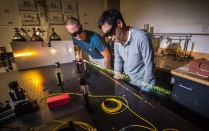Undergraduate Research Experience

Civil engineering professor James Jensen with students from UB's Research Exploration Academy in our Jarvis Hall Lab.
Through your research experiences, you’ll discover more than just facts and figures—you will discover yourself and your future career.
The School of Engineering and Applied Sciences offers many programs and opportunities to engage in creative research that addresses important societal needs. Explore our department websites to learn more about research opportunities within the school.
Why get involved in research as an undergraduate?
- You will learn something new and grow as a person and as a student. Research experience makes your resume more attractive to employers and your transcript more attractive to graduate schools.
- It will give you another good professional reference.
- Research experience may help you qualify for graduate school funding.
How to gain research experience at UB
- Use the services of the Experiential Learning Network here at UB.
- Familiarize yourself with the general areas of research conducted by departments and centers.
- Browse the undergraduate catalog for your major. Keep an eye out for concentrations of interest (and who teaches those courses in particular). Browse the faculty directory for research areas that align with your interests.
- Check the Research Experiences for Undergraduates webpage for summer research opportunities at UB.
- Consult with your faculty mentor or faculty advisor for assistance in finding a possible match.
- Remember you are never too young or too inexperienced. Everyone has to start somewhere and we are here to help you succeed.
- Be open to opportunities. Review all email forwarded to the SEAS listservs, read departmental newsletters and notices on bulletin boards, and learn from the experiences of other students and professors.
- Don’t turn down something just because you don’t think you’ll want to do it for the rest of your life. Research by definition builds upon itself and opens new frontiers. You never know where it will take you and it may introduce you to the research process. Your research experience doesn't have to determine your career path.
Making the connection
Step 1: Contact the professor(s) whose work you are most interested in.
Start by sending a brief email introducing yourself and your research interests. Ask for an appointment to discuss research topics, and when possible, give them ranges of times you are free the following two weeks.
Step 2: Meet with the professor to find out more.
Ask for ways to learn more and get involved. Seek referrals for others you might contact if necessary.
Step 3: Consult with your professor about whether or not your experience will warrant credit, and if so, how your credit will be evaluated (for a letter grade).
All SEAS departments have a 498 course number on the books to officially award academic credit for undergraduate research. This is often listed in the online class schedule (not the schedule wizard). Consult with the director of undergraduate studies about the possible use of such credit toward a technical elective in your major.
